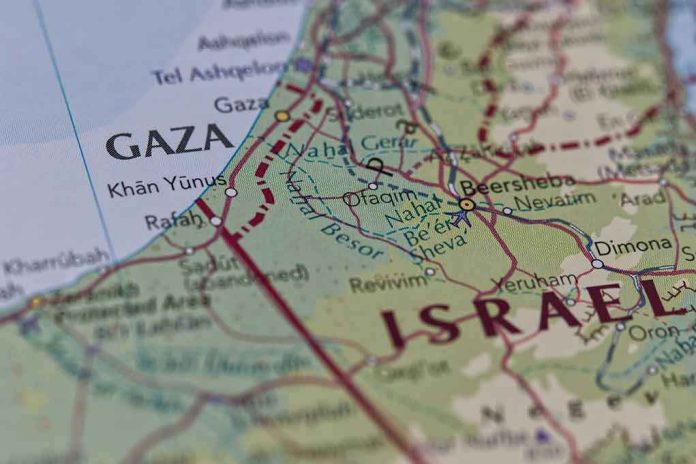
The decision by Israeli Prime Minister Benjamin Netanyahu to fully reoccupy the Gaza Strip has raised significant questions about the future of the region and its people.
Story Summary
- Prime Minister Benjamin Netanyahu orders full reoccupation of Gaza by the Israeli Defense Forces.
- Ceasefire talks have collapsed amid Hamas’s refusal to disarm or exit the territory.
- The decision marks a shift from previous military strategies, sparking internal and international controversy.
- Humanitarian conditions in Gaza are expected to worsen, raising concerns from rights groups.
Netanyahu’s Bold Decision
Israeli Prime Minister Benjamin Netanyahu has reportedly committed to a full reoccupation of the Gaza Strip, ordering the Israel Defense Forces (IDF) to take control of the region. This decision follows stalled ceasefire talks with Hamas, which has refused to disarm or leave the territory. The move is seen as a significant escalation in the ongoing conflict, marking a shift from previous limited military operations to a full-scale reoccupation.
On August 4, 2025, Israeli media reported Netanyahu’s order to expand the IDF’s offensive, following a war cabinet meeting that debated between pursuing a ceasefire or expanding military action. This decision reflects internal political pressures, particularly from right-wing coalition partners who have advocated for more assertive action against Hamas.
Historical Context and Ongoing Conflict
The Gaza Strip has long been at the center of the Israeli-Palestinian conflict. Israel withdrew from the region in 2005, but since Hamas took control in 2007, the area has seen repeated cycles of violence and blockades. While Israel has conducted major military operations in Gaza, it has avoided full reoccupation since the withdrawal.
In recent years, ceasefire talks have repeatedly stalled, and humanitarian crises have worsened. The decision to reoccupy Gaza comes amid severe conditions for civilians and increasing international pressure for restraint, raising concerns about the potential for prolonged conflict and instability in the region.
Stakeholders and Power Dynamics
Netanyahu’s decision is influenced by coalition politics, with hardline ministers like Itamar Ben-Gvir and Bezalel Smotrich supporting reoccupation. The IDF, led by Chief of Staff Eyal Zamir, has expressed reservations about the operational feasibility and long-term costs of reoccupation, leading to civil-military tensions. Hamas continues to resist Israeli demands, maintaining control over Gaza.
The decision’s impact on Palestinian civilians, who face increased violence and displacement, is profound. Within Israeli society, the reoccupation has sparked debate about the costs and benefits of such a military strategy, with concerns about potential regional destabilization and international isolation.
Implications and Reactions
Short-term implications include intensified military operations, increased casualties, and further displacement of Gaza’s population. Long-term, the reoccupation could lead to a prolonged insurgency and significant economic strain on Israel. The humanitarian crisis in Gaza is expected to deepen, challenging humanitarian organizations working in the region.
Military analysts warn of the risks of a protracted occupation, while political commentators highlight the influence of hardline ministers and the potential for internal division. Human rights groups and international observers caution against the humanitarian and legal consequences of the decision.
Sources:
The Real News/Mondoweiss, August 4, 2025
Anadolu Agency, August 4, 2025





